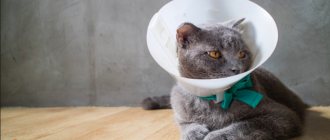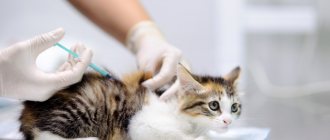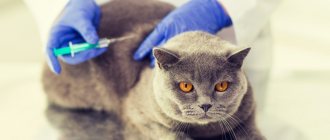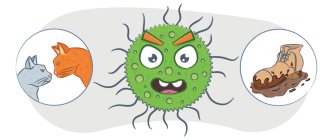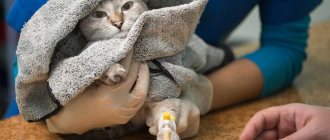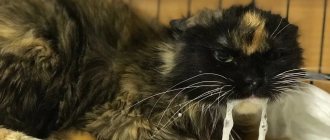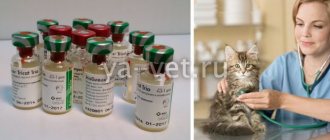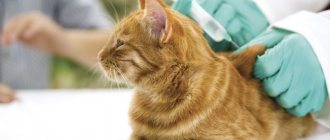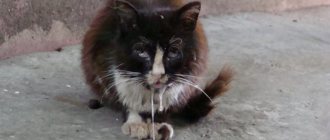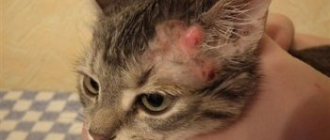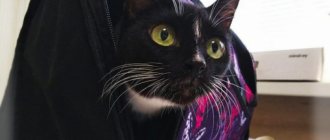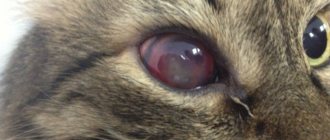Vaccination of animals is an important preventive measure. After vaccination, a kitten may experience some side effects and sometimes serious complications. At the same time, it will help protect the pet and owner from dangerous diseases. A caring person needs to know what reactions to vaccination may be in order to be prepared for it and try to avoid it. It is worth remembering that a rabid cat is contagious and dangerous to others.
Which ones are needed?
Some people believe that if a cat does not walk outside, then vaccinations are not necessary. But that's not true. An infectious disease that is dangerous for animals can be brought home on shoes. If the animal is accustomed to walking, then it is necessary to carry out a complex of vaccinations. Mandatory vaccinations include distemper, rabies, feline herpes and calcivirus. At the owner's request, the cat is vaccinated against chlamydia.
The first vaccination of a kitten is carried out at the age of 8-10 weeks against rhinotracheitis, calcivirus, panleukopenia. Revaccination - after 3-4 weeks. Rabies vaccinations are given no earlier than 12 weeks and repeated annually. It is recommended to use the vaccine from the same manufacturer each time. Especially if the cat tolerates it well. Quarantine after vaccination lasts 10-14 days, it is during this period that immunity to the disease is developed. It is necessary to limit the kitten from being outside and from contact with other animals, especially unvaccinated ones.
Manufacturers and brands of vaccinations
No vaccine manufacturer guarantees the absence of complications. There are vaccines for which complaints are received more often (Nobivac) and less frequently (PureVax). Other common brands that we do not mention in the article are recommended to a lesser extent. Let's look at the medications that veterinarians usually offer.
Nobivac
Nobivac vaccines (Nobivac, Holland) come in several varieties: Nobivac Tricat against viral rhinotracheitis, calicivirus and panleukopenia, Nobivac Rabies against rabies, etc. There are many complaints about these vaccines. There are serious consequences. Recently there was information in the English-language news that entire batches of the drug led to deaths. However, so far nothing has been proven on this score and the Nobivac vaccine is used by most veterinarians - as a rule, without consequences. In many localities, it remains one of the few ways to protect the animal.
Felocell
The Felocell vaccine (Felocell, USA) is intended for immunization of cats against viral rhinotracheitis, calicivirus infection, panleukopenia and chlamydia. The disadvantage of the quadrivalent vaccine is that it contains a component of chlamydia (it was written above that it is this that causes the main complications). It is better to stick with the trivalent vaccine. This brand also has a rabies vaccine. As for complications after Felocell, they also occur, but not so often.
Purevax
PureVax (France) is a much less common vaccine. However, veterinarians praise the drug: complications from it rarely occur. "Purevax" provides immunity from panleukopenia, calicivirus, rhinotracheitis and rabies. It is especially worth paying attention to rabies vaccines, which will be discussed below. In general, Purevax preparations are considered much more environmentally friendly than analogues from other companies. Disadvantages: higher price and unavailability in many localities. At the same time, ordering the drug via the Internet is dangerous, because... there is no guarantee that it will arrive, as expected, refrigerated.
Other manufacturers
Felinologists warn that allergies and autoimmune reactions are often observed with the Biofel vaccine; the Multifel vaccine is well tolerated, but its ability to develop immunity is questionable. There are also complaints of numerous allergic reactions to the Felovax vaccine.
Why is vaccination necessary?
It is important to have regular vaccinations for the following reasons:
If an animal is not vaccinated against rabies, then when it becomes ill, it becomes potentially dangerous to everyone.
- The diseases against which vaccines are created are deadly for animals. If an unvaccinated cat gets sick, then there is a high chance that everything will end in death.
- A sick cat poses a danger to other pets.
- Some diseases, such as rabies, are dangerous to humans. A cat can infect its owner. This disease is fatal to any living creature.
Routes of infection
The main and, in fact, the only thing is infection through a bite. In this case, the virus immediately enters the wound canal along with the saliva of the sick animal, and then begins to move towards the nearest nerve trunks. But there are still two more hypothetically possible ways of infection:
Through food. But! If a cat simply eats meat from a rabid animal, nothing bad will happen to it. The same applies to cases of eating “mad” milk. The problem is more complicated. The fact is that the maximum amount of the infectious agent is based in the brain. And even if the cat eats the brains of a sick animal, it most likely will not get sick, since in the acidic environment of the stomach the virus dies almost instantly. But in cases where there are wounds and scratches in the pet’s mouth and esophagus (received, among other things, while eating bones), infection is really real.
Infection by airborne droplets. But in this case, the verdict of the experts is clear – this cannot happen in “field” conditions. For infection in this case, an extremely high concentration of the virus in the air is required, which is unattainable even if the sick cat stays in the same room for the whole week.
This pathology is extremely dangerous due to the fact that once clinical symptoms develop in a person or animal, it is no longer curable. More precisely, if the cat has not been vaccinated and is suspected of having rabies, it must be euthanized (in some cases after quarantine, but not later than the appearance of the first symptoms). The bitten person is prescribed a course of monovalent autoimmune serum (the injections are extremely painful, but help save the patient’s life).
Dangerous consequences
Allergy to vaccine
Sometimes vaccination provokes an allergic rash in furry cats.
If the animal is allergic, the injection is administered under the influence of an antihistamine. If there was no allergy to the first vaccination, this does not mean that it will not happen again. The substance can accumulate and cause complications in the cat after vaccination. Can be light or heavy. It manifests itself in the form of rashes, itching, swelling of the mucous membranes, and in severe cases - of the respiratory tract and internal organs. Rarely - anaphylactic shock. Requires immediate medical attention. There may also be hair loss, loose stools, vomiting, altered behavior, and the cat becomes lethargic.
The pet is limping
After vaccinations, the cat may develop lameness, a lump at the injection site, a lump, swelling, or a ball under the skin. These symptoms go away after a few days, but sometimes last a long time. May be due to inept administration of the vaccine by a veterinarian or an individual reaction. Sometimes when the drug gets into a nerve ending or vessel. If the injections are injected into a large nerve and it is damaged, sometimes the hind legs even fail.
Mild course of the disease
Removing worms on the eve of the procedure guarantees a normal immune response to the vaccine.
After vaccination, the cat may get sick. This occurs due to reduced immunity due to worms, inflammatory processes or indolent diseases. Vaccination should be carried out when the animal is in full health, and anti-worm tablets should also be given before it. If the cat had contact with sick pets, that is, when the quarantine had not yet passed, then it is not surprising that it became infected. During this period, the immune system is weakened.
Kidney failure
Scientists have identified the relationship between the complex vaccine and this disease. These drugs are produced from cat kidney cells. Action - once in the body, antibodies begin to be produced against the same kidney cells, destroying them. As a result, kidney failure occurs. The reason is frequent vaccinations. This complication occurs rarely.
Sarcoma after vaccination
During rabies prevention, the animal may develop sarcoma.
A malignant cancerous tumor may develop at the site of vaccine administration. Called sarcoma. This happens very rarely. But such a formation grows quickly, and the result is that the cat died. This happens after a rabies vaccination that contains an adjuvant substance. Its actions are associated with causing an inflammatory process at the injection site and the formation of strong immunity. It is recommended to purchase vaccines without it. If the cat gets sick, in the early stages of the sarcoma an operation is performed to remove it, an injection is given intramuscularly into the paw - amputation is done.
Cat behavior during recovery from anesthesia
During recovery from anesthesia, the cat sleeps most of the time. After waking up, the owners may notice lethargy in the pet’s movements, an uncertain, unsteady gait caused by general weakness of the body (see what a cat’s behavior should be after sterilization).
There is no need to worry, as this is a normal course of the process of coming out of a drug-induced state. During this period, it is necessary to carefully monitor the pet, do not allow it to hide or climb too high.
It is not recommended to feed the cat on the first day after the operation, but the animal needs clean drinking water. You can switch to a traditional diet only after the pet has finally recovered from the effects of sterilization. At first, the food should be light, its quantity small. Otherwise, constipation will have to be treated. If the animal does not want to eat, you should not try to force feed it.
It is very common for cats to tremble after sterilization. In this case, there is also no need to worry, since trembling is a consequence of a violation of the body’s thermoregulation caused by surgical intervention.
What to do if complications occur?
If your cat has a reaction to vaccination, you need to take the following measures:
- If there is a lump or swelling at the injection site, doctors recommend massaging this area. Most often appears in the withers area. The same is done if the cat is limping.
- The lump turns into an abscess - antibiotics or surgery are prescribed to remove it.
- In case of nerve damage and paralysis, long-term therapy is carried out.
- If an allergic reaction occurs, you need to give your cat antihistamines. Anaphylaxis can manifest itself in the form of convulsions, loss of consciousness, and affects the gastrointestinal tract. If your pet feels sick or vomits, it may be a manifestation of an allergy. Urgent help from a veterinarian is needed with the administration of antihistamines and droppers to relieve intoxication.
- If the temperature rises, give an antipyretic.
If complications occur, you must inform your veterinarian.
Why vaccinate an animal?
Despite advanced technologies in the field of medicine and science, today there are no true antiviral drugs that would target a specific virus and destroy it, as happens with bacteria. Therefore, in the treatment of viral diseases, prevention is the best treatment! Today, vaccination is the only reliable way to avoid infectious diseases and the complications they cause. If the pet is not vaccinated, it will be at risk for infectious diseases and can become ill at any stage of life, which is fraught with a deterioration in the quality and quantity of the pet’s life, financial costs for therapy and moral distress during the period of treatment and rehabilitation.
Prevention
In order for everything to go well, it is better not to carry out disease prevention while the animal is pregnant.
To minimize the risk, you must adhere to certain rules. The vaccination must be done by a specialist in the clinic, so that the cat is under the supervision of a doctor for an hour. It is necessary to check the expiration date of the vaccine. Injections should be given when the animal is healthy and not wormed. Adhere to the vaccination and revaccination dates. After vaccination, do not bathe, do not wash the injection site, and do not overcool. Be sure to comply with quarantine. During teething in kittens and pregnancy in adult cats, it is better to abstain.
The owner should monitor the pet's condition in the first week. The cat stopped eating and drinking, vomited, a wound or other symptoms listed above appeared at the injection site; this must be reported to the veterinarian. Only he will decide whether to take measures for treatment. If a cat vomits, this may be a common individual symptom, or it may indicate the onset of anaphylactic shock.
If a lethargic cat does not eat or drink, what should I do?
Often, a pet's refusal to eat can frighten the owner. When a cat is lethargic and spends most of its time in one position, this is certainly not a good sign. If the cat does not eat or drink and only sleeps, it is necessary to understand the reasons for this behavior, because it is quite possible that your cat is sick and needs to be treated.
What does it mean for a pet to refuse food and drink?
There are situations when a cat does not eat or drink for several days, but only sleeps for no reason. If a cat does not eat and therefore loses its appetite, this can be called anorexia. However, an animal's appetite is determined by psychological factors, unlike hunger, which is a physiological phenomenon.
There can be many reasons why a cat does not eat for several days and only sleeps. Often, a kitten does not eat because some harmful processes have begun in its body, that is, a disease is emerging. As a rule, if a cat is lethargic, does not even drink water for a long time and lies in one place for most of the day, then this indicates diseases of the stomach or other main organs. After all, when experiencing severe pain, the animal will not have time to eat.
Note that if the pet is very lethargic during the day and does not even drink water, this may indicate the first heat. Owners think their pet is sick, but this is not the case. In this case, the animal begins to get acquainted with new natural urges, and this can lead it to confusion. This behavior and refusal of water and food may subside within a few days and then return to normal.
If the kitten does not eat anything for a long time and does not even drink water during the day, he is lethargic and does not want to do anything, then your pet is probably sick. Often infectious diseases such as worms are the cause of lack of appetite. To prevent your pet from losing weight and being lethargic, it is necessary
Source
How does the kitten feel after vaccination?
Vaccinations help protect your animal from many cat diseases. They are especially relevant for those pets who are provided with free range in the yard. But even for those exclusively at home, vaccination should not be neglected. As you know, the owner of an animal is capable of bringing the virus on his clothes or shoes. After all, we shouldn’t forget that there are a lot of stray animals walking around the city, and they are the ones who spread diseases.
Vaccinations are a prerequisite for taking a cat abroad for mating or to an exhibition. This will protect the animal from possible infection. Without them, the cat simply will not be allowed out of the country. All information about vaccinations is included in the accompanying document.
Choosing a clinic to vaccinate kittens is a responsible undertaking. Before vaccination, the kitten must be examined by a veterinarian. Only a healthy animal can be vaccinated. It is advisable to carry out anti-helminthic and anti-flea treatment.
Kittens are vaccinated between 8 and 12 weeks of age. Subsequent revaccination is required. After this, the adult cat is vaccinated annually. If the kitten's mother is vaccinated, then vaccination begins at 12 weeks. When an animal undergoes teeth replacement, at the age of 4-7 months, vaccination is not recommended.
Often, owners are frightened by the behavior of the kitten after vaccination. The animal becomes sleepy and lethargic, and its appetite disappears. However, after 6-8 hours everything returns to normal.
But monitoring your pet during this period is extremely important. If the kitten shows anxiety after vaccination, it starts to have seizures and foams at the mouth, you should urgently take it to the veterinarian
In exceptional cases, up to 2 days are allowed, during which the animal’s behavior gradually improves. If, after this, the kitten continues to refuse food and does not play, this is a serious reason to contact the clinic.
Source
